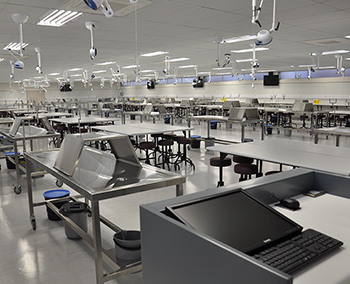Latest News Archive
Please select Category, Year, and then Month to display items
25 March 2024
|
Story Anthony Mthembu
|
Photo Lutendo Mabata
 Prof Nompumelelo Zondi, the newly appointed Vice-Dean: Research and Postgraduate Studies in the Faculty of The Humanities at the University of the Free State (UFS).
Prof Nompumelelo Zondi, the newly appointed Vice-Dean: Research and Postgraduate Studies in the Faculty of The Humanities at the University of the Free State (UFS).
Prof Nompumelelo Zondi has been appointed as Vice-Dean: Research and Postgraduate Studies in the Faculty of The Humanities at the University of the Free State (UFS). Prof Zondi assumed this new role on 1 March 2024 after serving as the Head of Department for African Languages at the University of Pretoria for seven years. “I consider this appointment as an opportunity of growth and learning more about higher education and the Faculty of The Humanities at large,” she said.
Prof Zondi indicates that part of her role is to spearhead the UFS Vision130 within the Faculty of The Humanities, and to ensure that the faculty assists the institution in becoming research-led, student-centred, and globally impactful.
Motivation for assuming this role
One of the primary reasons that led her to consider this role is sharing the knowledge she acquired as part of the Fulbright South African Research Scholar Programme. As a result of that experience and exposure, which went beyond the Ohio State University, she felt it befitting to implement some of the insights she acquired on a bigger scale. Therefore, even though she was impactful in her previous role, Prof Zondi believes that this is an exceptional and more desirable platform to do so. “I feel that I will have easier access to departments within the faculty, while also encouraging and supporting interdepartmental and faculty collaborations,” she explained.
A significant component of Vision 130
He believes that the elements that make up Vision 130 are interrelated. While she considers research central to Vision 130 – as she begins her journey at the UFS, she feels students deserve to be nurtured to further contribute to the university’s impactful research. Thus, student-centredness is the way to go. “I believe that students must be major role players in this Vision130; we must include them in the interactions and discussions that are part of the university’s strategic plan as well as in decision-making processes,” she said. As such, according to Prof Zondi, the more the faculty and the institution care for the students and involve them in Vision130 and in collaborations, the more research outputs the university will achieve.
New modern dissection hall ensures optimal learning experience for medical students
2015-12-14

New Dissection Hall in the Francois Retief Building on the Bloemfontein Campus.
Photo: Stephen Collett
|
The School of Medicine in the Faculty of Health Sciences at the university opened its doors on 6 June 1969. Three years later, a dissection hall for anatomy training was added to the school. This year, because of the prospective growth in the number of medical students as well as in changing methods of teaching and training, a new modern Dissection Hall has been completed on the Bloemfontein Campus. This ensures that students receive an optimal learning experience during dissection tuition.
The Dissection Hall was built as a double-storey wing to the existing Francois Retief Building. Covering 733m², the new facility is on the first floor - the same level as the existing hall - to allow easy access between the two facilities. The ground floor, totalling 465m², houses various offices for 16 people.
The new hall has special lighting and modern equipment for the training of second-year medical students in dissection. The hall also has high-quality sound and computer equipment. A unique camera system allows students to follow dissection demonstrations on 10 screens in the hall. Dissection demonstrations are recorded, enabling lecturers to compile new visual aid material for teaching and learning.
The dissection programme for medical students is of critical importance, not only for acquiring anatomical knowledge, but also for developing critical skills in medical students.
The new hall is also used for clinical workshops and postgraduate teaching seminars, as well as workshops in orthopaedics (shoulder, hip, and knee), otorhinolaryngology, cardiothoracic surgery (valve and endoscopy), and anaesthesiology, among others.
Both present and future generations of medical students will benefit from this new world-class facility.